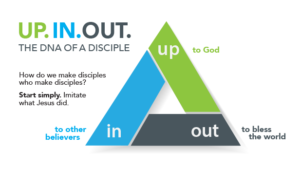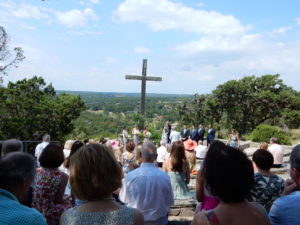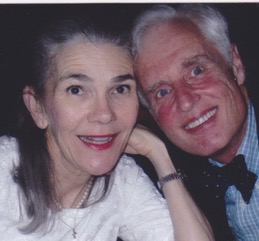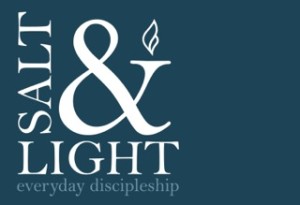 I like Bay Village, Ohio and especially like walking up Lake Road and looking at Lake Erie! From up on the bluff, the lake normally looks peaceful—that’s why it was surprising when one of our members told me he had some stairs that lead down to the lake and a shed destroyed by the waves of a recent storm. As I’ve talked to members who are sailors, they tell me that Lake Erie is subject to rapid changes in weather that can be quite dangerous. You can go out when the weather is nice and not be able to get back to shore to avoid a bad storm.
I like Bay Village, Ohio and especially like walking up Lake Road and looking at Lake Erie! From up on the bluff, the lake normally looks peaceful—that’s why it was surprising when one of our members told me he had some stairs that lead down to the lake and a shed destroyed by the waves of a recent storm. As I’ve talked to members who are sailors, they tell me that Lake Erie is subject to rapid changes in weather that can be quite dangerous. You can go out when the weather is nice and not be able to get back to shore to avoid a bad storm.
This reminds me of a story about some young sailors in Galveston Bay. A group of young men who loved to sail had a boat they kept on Galveston Bay. One morning, they went out together. It was a beautiful, sunny, hot Texas Gulf Coast day. Naturally, they drank a few beers as they sailed out into the Gulf of Mexico. They kept on partying and sailing, not noticing some dark and menacing clouds rushing in from the south. Then, one of them looked up and saw the approaching danger. Although they reversed course and headed for safety, they did not make it to the bay before the storm overcame them. One of them told me later it was the worst experience of his life. He thought he was going to die.
Life can be like that. We’re sailing along, not paying attention to what we’re doing, engaging in our favorite sin or avoiding some ministry or mission we know God would like us to undertake, thinking God will never catch up with us, when suddenly we run into a storm. In these times we feel as if we have been thrown overboard on the ship of life and swallowed by a whale.
The Prayer of a Reluctant Disciple
Jonah was a prophet during the reign of Jeroboam II. Jeroboam II managed to expand the Northern Kingdom of Israel all the way to Damascus, near the border of what is today Iraq and was then. Assyria. [1] Jonah heard the voice of God commanding him to go to Nineveh, which is today on the outskirts of Mosul, Iraq (Jonah 1:2). The Israelites feared and hated the Assyrians, so Jonah did not want to obey God.  Therefore, Jonah ran south and west to Joppa (the opposite direction), and bought a ticket on a boat to take him as far from Nineveh as you can get, west to Tarshish near the Straits of Gibraltar. [2] In the middle of the voyage, God sent a storm—a huge, dangerous storm; and, Jonah was faced with the consequences of his actions. He ended up thrown overboard into the crashing sea in order to save the lives of the crew of the ship.
Therefore, Jonah ran south and west to Joppa (the opposite direction), and bought a ticket on a boat to take him as far from Nineveh as you can get, west to Tarshish near the Straits of Gibraltar. [2] In the middle of the voyage, God sent a storm—a huge, dangerous storm; and, Jonah was faced with the consequences of his actions. He ended up thrown overboard into the crashing sea in order to save the lives of the crew of the ship.
Our text comes from Jonah 1:17 through all of Chapter 2. Hear the Word of God as it comes to us through the story of the Prophet Jonah:
Now the LORD provided a huge fish to swallow Jonah, and Jonah was in the belly of the fish three days and three nights. From inside the fish Jonah prayed to the LORD his God. He said: In my distress I called to the LORD, and he answered me. From deep in the realm of the dead I called for help, and you listened to my cry. You hurled me into the depths, into the very heart of the seas, and the currents swirled about me; all your waves and breakers swept over me. I said, ‘I have been banished from your sight; yet I will look again toward your holy temple.’ The engulfing waters threatened me,the deep surrounded me; seaweed was wrapped around my head. To the roots of the mountains I sank down; the earth beneath barred me in forever. But you, LORD my God, brought my life up from the pit. “When my life was ebbing away, I remembered you, LORD, and my prayer rose to you, to your holy temple. Those who cling to worthless idols turn away from God’s love for them. But I, with shouts of grateful praise, will sacrifice to you. What I have vowed I will make good. I will say, ‘Salvation comes from the LORD.’”And the LORD commanded the fish, and it vomited Jonah onto dry land(1:17-2:10).
Let us pray: God of Grace and Mercy we need to hear the message that you not only listen to our prayers when we are in your will—but you listen to our prayers when we are not in your will. Come by the Power of Your Spirit that we may be convicted, converted and made wholly yours. In Jesus Name, Amen.
Great Prayers of Reluctant Disciples are often Born in Bad Circumstances
Years ago, I posted a comment on Facebook that went something like this:“Life can be like the experience of Jonah: We sin, we get thrown overboard, and we think things cannot get worse. Then we see the whale….”We, like Jonah, often continue on avoiding God and God’s will until we can’t avoid it any longer. We often talk about people who only pray when they’re in trouble in a kind of critical way. It’s true we should not just pray to God we were in trouble, but it’s also true that many of us pray our most life-changing prayers when we are in trouble.
 When Chapter 2 opens, Jonah is in big trouble. He has disobeyed God and been thrown into the sea to drown. We can imagine that, after being thrown overboard, Jonah struggled to keep his head above water. His efforts were doomed. Sooner or later, he was bound to drown in the raging sea. Perhaps, he was at the edge of drowning, having given up all hope when he saw the open mouth of a huge fish. What happened next is unimaginable: Jonah ended up in bad circumstances in the belly of a giant fish.
When Chapter 2 opens, Jonah is in big trouble. He has disobeyed God and been thrown into the sea to drown. We can imagine that, after being thrown overboard, Jonah struggled to keep his head above water. His efforts were doomed. Sooner or later, he was bound to drown in the raging sea. Perhaps, he was at the edge of drowning, having given up all hope when he saw the open mouth of a huge fish. What happened next is unimaginable: Jonah ended up in bad circumstances in the belly of a giant fish.
None of us likes to suffer. None of us likes to deal with the consequences of our sin and brokenness. None of us likes to be confronted by our failure to follow Jesus and be devoted disciples. None of us likes our time in the belly of a whale. Yet, when you ask people when during their life they grew the most spiritually, it is common for them to refer to a time of danger, struggle and suffering. Often, it’s a time when they suffered or struggled as a result of their own poor decisions or behavior. In my own life, I can say that times of great spiritual growth have often been times of stress and failure. We may not like times in our lives when we have to sit in the belly of a whale, but we can be sure that Christ brings us to those times for our own good. We cannot necessarily control our bad times, but we can grow in them.
Great Prayers Focus on our Sinful Circumstances
Most of Chapter 2 is taken up with a long prayer, sometimes in the past tense.  Like us when we are in trouble, Jonah confronted suffering and approaching death in the face in the belly of the whale and was moved to pray. Surrounded by stomach acid and seaweed, Jonah prayed fervently, and he was changed and his life was changed as a result. Some scholars question the prayer because it is the past tense. I can’t resolve the scholarly issue, but to me it is obvious that Jordan didn’t have a piece paper and pencil (or clay tablet and stylus) in the belly of the whale. He prayed in the belly of the whale, but he wrote down the prayer later. [3] It was a prayer in which Jonah acknowedeged his circumstances and his need of God’s mercy.
Like us when we are in trouble, Jonah confronted suffering and approaching death in the face in the belly of the whale and was moved to pray. Surrounded by stomach acid and seaweed, Jonah prayed fervently, and he was changed and his life was changed as a result. Some scholars question the prayer because it is the past tense. I can’t resolve the scholarly issue, but to me it is obvious that Jordan didn’t have a piece paper and pencil (or clay tablet and stylus) in the belly of the whale. He prayed in the belly of the whale, but he wrote down the prayer later. [3] It was a prayer in which Jonah acknowedeged his circumstances and his need of God’s mercy.
None of us likes admitting that we are sinners. God, of course, knows we are sinners. God is pleased when we come to him with a humble and contrite heart (Psalm 51:17). One of the most amazing statements of Scripture is that David was a man after God’s own heart (Acts 13:22). David was not a perfect person. During the course of his life, he committed some serious sins. Nevertheless, David was open with God. After his sin with Bathsheba and murder of her husband, he went to God and confession and with faith that God would forgive him (Psalm 51). God did forgive and restore David. God loves us when we are open to God about our sins, brokenness, and shortcomings. This is a part of becoming a person after God’s own heart.
Years ago Kathy and I were going through a difficult time. Not only did we have our own four children to take care of, we were taking care of a couple of others. As a result, Kathy did not have a lot of time for me. I just taken a new job and was under quite a bit of stress, and did not have much time for her. During those years, I used to take off one day a month, go to a special place, and pray. One Friday, I took a day off and went to pray. And I began to pray a great prayer of confession—for Kathy’s sin in ignoring me! In a moment, I heard God say in my mind, “You jerk!” For the rest of the day, I focused on Psalm 51!
Recognizing that we are sinners and in need of God’s salvation is an important step in spiritual growth. Often when things go wrong we focus on what someone else is doing instead of what we’re doing! The first step to getting our prayers answered is to be open with God about ourselves.
Great Prayers Recognize that God is a Great Savior
This is a good place to stop again for a moment and think about what the Bible says about that huge fish: it says that God sent the fish to swallow Jonah. God sent the fish. I am sure Jonah was terrified when he saw this fish. The Jews were not a sea faring people. They feared the sea and they feared the huge fish of the open sea. The Hebrews even had a name for the most fearsome of the Big Fish of the Sea: Leviathan. [4] That name is connected in Scripture with the presence of the power of evil. But, was this fish evil? I don’t think so. This fish is a result of God’s love for Jonah.
Jonah was about to drown. God sent the fish not as an instrument of suffering but as a way to save Jonah’s life. God sent the fish to swallow Jonah because he loved and wanted to save Jonah. If God had not sent the fish, Jonah would have drowned. So often when we sense that we have sinned and God sends something unpleasant or dangerous into our lives, we think of it as an evil. We think God is punishing us too harshly. We feel deserted by God. When this happens we need to think for a moment—perhaps our whale is God’s way of saving our life.
As Jonah prayed in the belly of the whale, he recognized God as his Savior (Jonah 3:9). Like us, the Jewish people had some mistaken ideas about God. Like us, they didn’t always understand who God was or what God is really like. Sometimes, they forgot that God is a God of the entire universe and loves everyone and everything he has made. It was only slowly and over time that they understood that God loves everyone and everything he has made, including us when we are separated from God by our sin and self-centeredness.
Jonah got on the ship thinking he could out-run God. Perhaps God could not find him in far off Tarshish. He learned that God is everywhere, even in the belly of a whale. In the process, Jonah learned that God is a great God of salvation with the power to save people even from the belly of a whale. The Jewish people, in their captivities in Egypt and in Babylon learned that the God of Israel was everywhere and able to save them from anything.
This means that God can save us from anything, even from the raging seas we have brought upon ourselves by our sin and disobedience. God can use us no matter what we’ve done, even if by our sin we’ve ended up in the belly of a whale. This is really good news.
The whale was sent to save Jonah, and sometimes we get swallowed by whales of our own as we flee from God. When this happens, it’s important to recognize that the God of love is working and love to save us.
Great Prayers Result in a Great Deliverance
 In his prayer, Jonah recognized that he had been cast into the deep—really into the grave, to the place of death itself. In this time of darkness and dereliction, Jonah felt that God had abandoned him to the grave. But, God had not deserted Jonah.
In his prayer, Jonah recognized that he had been cast into the deep—really into the grave, to the place of death itself. In this time of darkness and dereliction, Jonah felt that God had abandoned him to the grave. But, God had not deserted Jonah.
Instead, there in the belly of the whale God forgave Jonah and brought his lifeup“from the pit” (Jonah 2:6). The last verse of Jonah 2 tells us that the whale “vomited Jonah onto dry land” (v. 2:10). Jonah was delivered from impossible circumstances. He had sinned. He ended up thrown overboard into a raging sea. He was certain to die. Then, he was swallowed by a great fish, a symbol of chaos and violence of nature. Out of these circumstances, he was saved.
Jesus refers to Jonah and his three days in the whale as prefiguring his own release from death. In Matthewand Luke, the following is recorded:
Then some of the Pharisees and teachers of the law said to him, “Teacher, we want to see a sign from you.”
He answered, “A wicked and adulterous generation asks for a sign! But none will be given it except the sign of the prophet Jonah. For as Jonah was three days and three nights in the belly of a huge fish, so the Son of Man will be three days and three nights in the heart of the earth. The men of Nineveh will stand up at the judgment with this generation and condemn it; for they repented at the preaching of Jonah, and now something greater than Jonah is here (Matthew 12:38-41).
The deliverance of Jonah prefigures the deliverance of Jesus from the grave, and our deliverance from sin and death because of what Jesus did on the cross.
Conclusion
 Today is Pentecost. It’s appropriate that we study Jonah’s prayer during Pentecost. In the Upper Room, the disciples prayed together as they waited the gift of the Holy Spirit. On Pentecost, God answered those prayers sending his Holy Spirit upon the disciples in order that they could be sent into the world to share the Gospel. We are in a time in our church’s life when we are in an Upper Room of sorts, awaiting God’s answer to our prayers. Last week, we had a special service. It was wonderful! Everyone who came felt the power of the Holy Spirit as we worshiped together in the Sanctuary, walked the building praying together, and had communion together in Auburn Hall.
Today is Pentecost. It’s appropriate that we study Jonah’s prayer during Pentecost. In the Upper Room, the disciples prayed together as they waited the gift of the Holy Spirit. On Pentecost, God answered those prayers sending his Holy Spirit upon the disciples in order that they could be sent into the world to share the Gospel. We are in a time in our church’s life when we are in an Upper Room of sorts, awaiting God’s answer to our prayers. Last week, we had a special service. It was wonderful! Everyone who came felt the power of the Holy Spirit as we worshiped together in the Sanctuary, walked the building praying together, and had communion together in Auburn Hall.
We have many opportunities weekly and monthly to pray for our members, for our church, for our families, for our nation, and for the needs of our world. We have morning and evening prayer groups. There are stations set up around the church, where you could come and pray for specific needs as you walk the halls. We have a special early-morning prayer time, where people can stop and pray on their way to work. We’re praying for a lot of things: we are praying for the pastoral search committees, for unity in our church, for our worship time together, for our missionaries, and especially for Andrew Brunson,and for an outpouring of the Holy Spirit upon all of us and our congregation.
AMEN
Copyright 2018, G. Christopher Scruggs, All Rights Reserved
[1] Jonah is recorded has having prophesied in the reign of Jeroboam II, somewhere around 793-753 B.C. This period included a time of Assyrian decline, which allowed Jeroboam II to expand his kingdom. See, G.J. Wenham, et al, The New Bible Commentary21stCentury ed. (Downer’s Grove, IL: InterVarsity Press, 1994), 815).
[2] Most scholars believe that Tarshish was a Spanish city on the Atlantic outside the Straits of Gibraltar. In other words, the writer of Jonah wants to let us know that Jonah didn’t just avoid doing regarded as he went in the opposite direction to the farthest place possible, as far from Nineveh and God as he could possibly get.
[3] Scholars often down to the originality of the prayer, some thinking that the entire book is a kind of parable about Israel and its disobedience and others that the prayer was inserted later into the story of Jonah. Most of us would not write a prayer in the belly of a whale. We would just pray. Later, we might sit down and remember what we said or thought as we prayed in our distress. The point of the scholars can be important as we recognize that the book was important to the Jews as it related to their own history and to their sin, disobedience, judgement and deliverance. The importance to the Jews of the story of Jonah is shown by its reading on Yom Kippur.
[4] Interestingly, the word used is not the Hebrew for “Leviathan.” The word used means “big fish.” Nevertheless, the book contains imagery designed to bring that image to mind. See, Scott B. Noegel, Jonah and Laviathin: Inner-Biblical Allusions and the Problem with Dragons” http://faculty.washington.edu/snoegel/PDFs/articles/noegel-jonah-2015.pdf(downloaded May 17, 2017). As I often mention, because the Jews were not a seafaring people, they feared the wild raging seas, they also feared sea creatures. The whale in Jonah is a concrete example of this fear. This is not in the least impact the truthfulness of scripture or its power to bring us closer to God. This story brings us closer to God as we apply apply it to our own lives. Its inspiration is proved by its power to bring endless generations closer to God.



















































